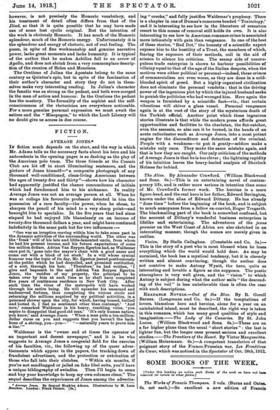FICTION.
AVERAGE JONES.*
IN fiction much depends on the start, and the way in which Mr. Adams tells us the necessary facts about his hero and his antecedents in the opening pages is as dashing as the play of the American polo team. The three friends at the Cosmic
Club are hit off in short illuminating sentences, and the picture of Jones himself—" a composite photograph of any thousand well-conditioned, clean-living Americans between the ages of twenty-five and thirty "—shows bow his character had apparently justified the chance concomitance of initials which bad foredoomed him to his nickname. In reality Average Jones was not an average person at all. When he was at college his favourite professor detected in him the possession of a rare faculty—the power, when he ellipse, to sharpen the pencil of his mind to a very sharp point—and besought him to specialize. In the five years that had since elapsed he bad enjoyed life blamelessly on an income of twenty-five thousand dollars a year, and might have continued indefinitely in the same path but for two influences :—
" One was an irruptive craving within him to take some part in the dynamic activities of the surrounding world. The other was the freak' will of his late and little-lamented uncle, from whom he had his present income, and his future expectations of some ten million dollars. Adrian Van Reypen Egerton had, as Waldemar once put it, gone into the mayor's chair with a good name and come out with a block of ice stock.' In a will whose cynical humour was the topic of its day, Mr. Egerton jeered posthumously at the public which be had despoiled, and promised restitution, of a sort, through his heir. ' Therefore,' he had written, I give and bequeath to the said Adrian Van Reypen Egerton Tones, the residue of my property, the principal to be taken over by him at such time as he shall have completed -five years of continuous residence in New York City. After such time the virus of the metropolis will have worked through his entire being. He will squander his unearned and 'undeserved fortune, thus completing the vicious circle and returning the millions acquired by my political activities, in a poisoned shower upon the city, for which, having bossed, bullied and looted it, I feel no sentiment other than contempt.' 'And now,' remarked Waldemar in his heavy, rumbling voice, 'you aspire to disappoint that good old man.' It's only human nature, you know,' said Average Jones. When a man puts a ten-million- dollar curse on you and suggests that you haven't tho back- bone of a shrimp, you—you—' —naturally yearn to prove him a liar.' " Waldemar is the "owner and at times the operator of an important and decent newspaper," and it is he who suggests to Average Jones a congenial field for the exercise
-of his faculties, viz., the following up of the queer adver- tisements which appear in the papers, the tracking down of fraudulent advertisers, and the protection or extrication of those who fall into their clutches. " Within six months, if you're not sandbagged or jailed on fake libel suits, you'll have a unique bibliography of swindles. Then I'll begin to come .and buy your knowledge to keep my own columns clean." The sequel describes the experiences of Jones among the advertis-
* Average Jones. By Samuel Hopkins Adams. Illustrations by M. Leon Bracker. London: Frank Palmer. [6s.]
ing "crooks," and fully justifies Waldemar's prophecy. There is a chapter in one of Dumas's romances headed " Toxicology,' and it is interesting to see bow in the literature of sensation resort to this means of removal still holds its own. It is also interesting to see how in American romance crime is associated more intimately with gain than vengeance. In one of the best of these stories, "Red Dot," the honesty of a scientific expert exposes him to the hostility of a Trust, the members of which, fearing the exposure of their methods, call in the aid of science to silence his criticism. The seamy side of unscru- pulous trade enterprise is shown to harbour possibilities of villainy equal to that of the age of the Italian despots, when the motives were either political or personal—indeed, these crimes of commercialism are even worse, as they are done in a cold- blooded spirit of greed. But a highly organized civilization does not eliminate the personal vendetta : that is the driving power of the ingenious plot by which the injured husband 'seeks to punish the politician who bad wronged him. Here again the weapon is furnished by a scientific fact—viz., that certain vibrations will shiver a glass vessel. Personal vengeance again is at the root of the story of the mysterious death of the Turkish official. Another point which these ingenious stories illustrate is that while the modern press affords great opportunities and facilities to the charlatan, the flat-catcher, even the assassin, so also can it be turned, in the hands of an acute ratiocinator such as Average Jones, into a most potent engine for the discomfiture and detection of the criminal. People with a weakness—to put it gently—seldom make a mistake only once. They make the same mistake again, and that is how they are caught. Our only criticism of the methods of Average Jones is that he is too clever ; the lightning rapidity of his intuition leaves the heavy-heeled analysis of Sherlock Holmes far behind.














































 Previous page
Previous page